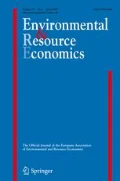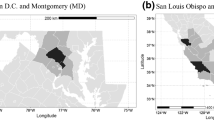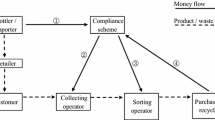Abstract
There have been occasional ad hoc efforts to influence consumer behaviour by the imposition of product taxes that reflect external costs imposed by such products that are not initially included in their price. In the spirit of this idea, in 2002 Ireland introduced a 15 Euro cent tax on plastic shopping bags, previously provided free of charge to customers at points of sale. The effect of the tax on the use of plastic bags in retail outlets has been dramatic—a reduction in use in the order of 90%, and an associated gain in the form of reduced littering and negative landscape effects. Costs of administration have been very low, amounting to about 3% of revenues, because it was possible to integrate reporting and collection into existing Value Added Tax reporting systems. Response from the main stakeholders: the public and the retail industry, has been overwhelmingly positive. Central to this acceptance has been a policy of extensive consultation with these stakeholders. The fact that a product tax can influence consumer behaviour significantly will be of interest to many policymakers in this area. This paper analyses the plastic bag levy success story and provides insights and general guidelines for other jurisdictions planning similar proposals.
Similar content being viewed by others
Notes
The term ‘plastic bag’ used in this paper is the same as defined in the Irish Waste Management (Amendment) Act 2001, Section 9. This Act describes a plastic bag as a bag which is inter alia: (a) made wholly or in part of plastic, and (b) which is suitable for use by a customer at the point of sale in a supermarket, service station or other sales outlet. For more see: http://www.irishstatutebook.ie/ZZA36Y2001S9.html.
Pearce and Turner (1992) assess a tax on packaging waste.
‘Levy’ is the official term used in the Waste Management (Amendment) Act (2001). In this paper, we use the words tax and levy interchangeably.
Department of the Environment, Heritage and Local Government Press release 20/12/2001: www.environ.ie/DOEI/doepub.nsf.
Customers can purchase permanent bags at the point of sale in most retail outlets. The potential substitution from plastic to paper bags instead of permanent bags was not a concern when the tax was introduced since it was not in the interest of the retailers to provide this option; many retailers in the retail survey made the observation that the storage costs of paper bags are substantially higher than those of plastic bags.
It could be argued that people whose behaviour was modified by the levy were not littering in the first place!
In the act, there is provision for an on the spot fine of € 125 or a fine not exceeding € 3,000 if convicted in court (http://www.oasis.gov.ie/environment/litter_law.html.).
In personal communication with the DOELG (December 2002), officials indicated that the projects undertaken using these funds to finance inter alia recycling facilities and infrastructure as well as educational programmes were above and beyond the pre-existing level or the levels in the absence of such a fund. The extent of this is, however, unclear.
There is, however, a large disparity in petrol and diesel prices between the two jurisdictions, because of much higher excise duties applied in the UK, and this does result in considerable leakage of consumption from Northern Ireland to the Republic of Ireland.
UNEP (2005) recommends a seven-pronged approach that includes a levy on suppliers rather than on consumers. The rationale is that in Kenya, being a developing economy, the administrative burden is far less for the former policy than for the latter and there also exists a considerable ‘casual’ market in which it would be difficult to monitor and collect revenues from a consumer-based levy. This is not such an important consideration in developed countries.
Interdepartmental agreement between the Department of Environment and Local Government and the Revenue Commissioners.
Personal communication with the Department of the Environment, Heritage and Local Government and the Revenue Commissioners (December 2002).
Personal Communication, Revenue Commissioners, Ireland (December 2004).
The major UK department stores were initially reluctant to implement, because their centrally controlled and defined accounting systems needed to be adapted. However, after some delay, they are now fully compliant.
http://www.antaisce.org/projects/ibal.html.
Traces are defined as up to five items over a linear distance of 1 m.
Retailer B was so pleased with the take up of its long life bags (that reduced its costs of providing plastic bags) that it advertised in its stores it was absorbing the 1% VAT increase which was introduced in 2002 because of its significant savings on plastic bags.
The questionnaires of the surveys are available from the authors upon request.
References
Barker T, Köhler J (1998) Equity and Ecotax reform in the EU: achieving a 10% reduction in CO2 emissions using excise duties. Environmental fiscal reform. Working Paper No. 10. University of Cambridge, Cambridge
Baumol WJ, Oates WE (1988) The theory of environmental policy, 2nd edn. Cambridge University Press
Bohm P (1981) Deposit refund systems: theory and applications to environmental, conservation, and consumer policy. Resources for the future, John Hopkins University Press, Baltimore
Bovenbergh AL, Van der Ploeg F (1998) Consequences of environmental tax reform for involuntary unemployment and welfare. Environ Resour Econ 12(2):137–150
Callan SJ, Thomas JM (1999) Adopting a unit pricing system for municipal solid waste: policy and socio-economic determinants. Environ Resour Econ 14(4):503–518
Choe C, Fraser I (2001) On the flexibility of optimal policies for green design. Environ Resour Econ 18(4):367–371
Drury Research on Behalf of the Department of the Environment and Local Government (2000) Attitudes and actions – a national survey on the environment. Drury, Dublin
Ekins P, Speck S (1999) Competitiveness and exemptions from environmental taxes in Europe. Environ Resour Econ 13:369–399
Fehily, Timoney & Company (1999) Consultancy study on plastic bags. Report prepared for the Department of Environment and Local Government, Dublin
Fullerton D, Kinnaman TC (1996) Household responses to pricing garbage by the bag. Am Econ Rev 86:971–984
Goulder LH (1995) Environmental taxation and the “double dividend”: a reader’s guide. Int Tax Public Finance 2(2):157–183
Goulder L, Parry I, Burtraw D (1997) Revenue-raising vs. other approaches to environmental protection: the critical significance of pre-existing tax distortions. RAND J Econ 28(4):708–731
Irish Tourism Industry Confederation (ITIC) (2004) http://www.itic.ie/research_economy2.htm
Jaffe A, Peterson P, Portney P, Stavins R (1995) Environmental regulation and the competitiveness of US manufacturing: what does the evidence tell us? J Econ Liter 33:132–163
OECD (2001) Environmentally related taxes in OECD countries: issues and Strategies. OECD, Paris
Pearce DW, Turner RK (1992) Packaging waste and the polluter pays principle: a taxation solution. J Environ Manage Plan 35(1):5–15
Pigou AC (1960) The economics of welfare, 4th edn. MacMillan, London
Stavins R (2001) Experience with market based environmental policy instruments. Resources for the Future Discussion Paper 99-09. http://www.rff.org/disc_papers/pdf_files/0009.pdf Accessed January 12th 2006
Sterner T (2003) Policy instruments for environmental and natural resource management. Resources for the future, Washington DC
The Litter Monitoring Body (2003) The National Litter Pollution Monitoring System – system result. TES Consulting Engineers, Dublin. Available online at http://www.litter.ie/docs/DoEHLG%20System%27s%20Results%20Report%20Final%202002.pdf
The Litter Monitoring Body (2004) The National Litter Pollution Monitoring System – system result. TES Consulting Engineers, Dublin. Available online at http://www.litter.ie/Litter%20Reports%20August%202004/Systems%20Results%20Annual%20Report%20August%202004%20Final.pdf. Accessed January 12th, 2006
The Litter Monitoring Body (2005) The National Litter Pollution Monitoring System – system result. TES Consulting Engineers, Dublin. Available online at http://www.environ.ie/DOEI/DOEIPol.nsf/0/b25ca5135fc9b0e780256f0f003bc819/$FILE/Annual%20Report%20Final%20August%202005.pdf
The Waste Management (Amendment) Act (2004) Irish Statute Book Database Government of Ireland. Available at: http://www.irishstatutebook.ie/ZZA36Y2001.html
UNEP (2005) Selection, design and implementation of economic instruments in the Kenyan solid waste management sector. United Nation Environment Programme, Geneva, Switzerland
Author information
Authors and Affiliations
Corresponding author
Rights and permissions
About this article
Cite this article
Convery, F., McDonnell, S. & Ferreira, S. The most popular tax in Europe? Lessons from the Irish plastic bags levy. Environ Resource Econ 38, 1–11 (2007). https://doi.org/10.1007/s10640-006-9059-2
Received:
Accepted:
Published:
Issue Date:
DOI: https://doi.org/10.1007/s10640-006-9059-2




